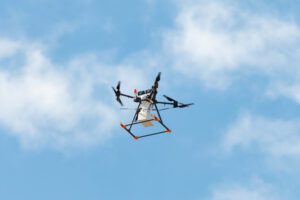
By DRONELIFE Features Editor Jim Magill
DroneUp, one of the largest drone delivery companies in the U.S., will likely expand its operations as a direct result of the passage of the bill to reauthorize the Federal Aviation Administration, Anthony Vittone, the company’s COO said in an interview.
“I think the authorization bill is probably one of the biggest things to help the advancement of drones into the national airspace, maybe even bigger than Part 107,” Vittone said.
“What this whole authorization bill is going to do is allow us all, especially drug delivery companies, to accelerate our operations, accelerate the scalability,” he said. “Right now, we operate 34 operations for Walmart in six different states. And, this provides a path forward for us to scale those operations and to expand this program.”
He said the drone delivery industry as a whole — including delivery service providers, retailers and customers — has been waiting for the passage of the legislation to see how the industry would develop over the next several years.
The reauthorization bill, which Congress passed on a bipartisan basis and which was signed into law by President Biden earlier this month, contains a number of provisions designed to encourage the growth of the commercial drone industry. Among the bill’s most significant drone-related provisions is a section that mandates the FAA to develop a final rule for the operation of drones beyond the visual line of sight (BVLOS) within 20 months.
In addition to the BVLOS provisions, Vittone pointed to several other parts of the bill that are of particular interest to companies that offer retail drone delivery service, including sections that cover noise and the development of a programmatic-level approach toward environmental assessments.
One of the biggest stumbling blocks slowing the rapid development of a drone-delivery ecosystem has been the need for system developers to conduct individual environmental assessments for each new project, he said.
For example, DroneUp, which focuses much of its drone delivery operations in the Dallas/Fort Worth area, is currently working on an environmental assessment for a project in Dallas. “It’s taking over a year, it’s very expensive, and it’s all to do an assessment on a drone that operates with battery power and has less noise than a UPS truck. So, it’s a lot of effort for not a lot of return in our opinion.”
Multiplied across the entire drone delivery industry, with each retailer having to repeat that same study in every metro across the country, “there’s no way that that works,” Vittone said.
Another way in which the reauthorization legislation will help speed the growth of the retail delivery industry is in its call for the FAA to revise its guidelines for drone transportation of hazardous materials. Under current regulations, service providers such as DroneUp, which carry retail items from drug stores to the consumer, are prohibited from carrying common, everyday items, such as lipstick and hairspray because they’re designated by the FAA as being hazardous materials.
“Lighter fluid will probably always be excluded, but I can carry lipstick, I can carry hairspray, I can carry mouthwash,” Vittone said.
“This law does a great deal in helping to accelerate the drone industry as a whole and delivery in particular,” he said. “It has given a lot of confidence, I think, to customers, to investors, to all of the different people involved in the drone industry to help show that drones are being integrated into the national airspace, and that this is a program that the government is serious about.”
Wing CEO express support for new law
“Today marks a significant milestone along this path as the president has signed into law the FAA reauthorization bill following overwhelming bipartisan support in Congress,” Adam Woodworth, CEO of Alphabet’s Wing, said in a blog post following the passage of the bill.
“At Wing, we are encouraged by what we see in the law’s final language and are excited to work with the FAA on implementation of the law’s provisions over the months to come.”
Woodworth, who had testified on the UAS provisions of the bill before the House Transportation and Infrastructure Committee’s subcommittee on Aviation last year, said under the current regulatory regime, drone operators were uncertain as to the “test we had to pass” to obtain the regulatory approvals needed to expand operations and adopt innovations.
“The FAA reauthorization attempts to fix some of these issues and I am encouraged to see a policy framework now set by Congress in law to allow a new predictable and pragmatic framework for regulating uncrewed aviation,” he wrote.
Miriam McNabb is the Editor-in-Chief of DRONELIFE and CEO of JobForDrones, a professional drone services marketplace, and a fascinated observer of the emerging drone industry and the regulatory environment for drones. Miriam has penned over 3,000 articles focused on the commercial drone space and is an international speaker and recognized figure in the industry. Miriam has a degree from the University of Chicago and over 20 years of experience in high tech sales and marketing for new technologies.
For drone industry consulting or writing, Email Miriam.
TWITTER:@spaldingbarker
Subscribe to DroneLife here.